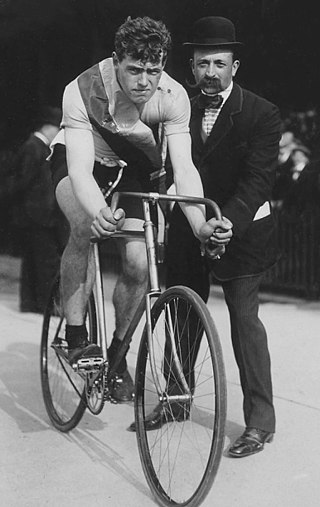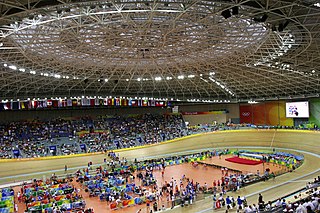
At the 1904 Summer Olympics, seven cycling events were contested.

The 1900 Summer Olympics were held as part of the 1900 World's Fair, during which many cycling events were contested. The IOC website currently affirms a total of 3 medal events, after accepting, as it appears, the recommendation of Olympic historian Bill Mallon regarding events that should be considered "Olympic". These additional events include the men's points race. Thus, three cycling events are considered Olympic events. These three competitions were held between 9 September and 16 September 1900. The cycling part of the World's Fair included 250 competitors, 160 of them French. In the sprint and 25 km events, 72 competitors, all men, from seven nations competed.

Cycling has been contested at every Summer Olympic Games since the birth of the modern Olympic movement at the 1896 Summer Olympics, at which a road race and five track events were held. Mountain bike racing entered the Olympic programme at the Atlanta Olympics, followed by BMX racing in 2008 and freestyle BMX in 2020. Before the 2020 Summer Olympics, all events were speed races, but the 2020 programme featured BMX freestyle for the first time.

The men's 10 kilometres was one of the five track cycling races on the Cycling at the 1896 Summer Olympics programme. It was held on 11 April and comprised 30 laps of the track. The 1896 Games was the only time that the 10 kilometres track race was part of the cycling program at an Olympic Games. Six cyclists from four nations competed. The event was won by Paul Masson of France, the second of his three victories that day. His countryman Léon Flameng finished second, while Austrian Adolf Schmal was third.

The men's sprint was one of the three cycling events, all track cycling, now regarded as "Olympic" on the Cycling at the 1900 Summer Olympics programme. It was held on 11 September and 13 September. The sprint, a 2000-metre race with 1000-metre heats, was conducted in four rounds. 69 of the 72 cyclists competed in the sprint, including cyclists from all six competing nations. The event was won by Albert Taillandier of France, with his countryman Fernand Sanz in second place. John Henry Lake of the United States won the nation's first cycling medal with his bronze.

The men's 25 kilometres was one of three cycling events, all track cycling, on the Cycling at the 1900 Summer Olympics programme that were open to all amateurs, had more than one nation participating and no handicapping. It was held on 15 September. Ten cyclists competed. Four had already competed in the sprint event. The result of the race proved Louis Bastien of France to be the top long-distance cyclist present, while Lloyd Hildebrand finished in second and Auguste Daumain in third. One of the contestants, Louis Trousselier, would go on to win the 1905 Tour de France. Prizes were awarded to the top four finishers: art objects valued at 400 francs, 300 francs, 200 francs (third), and 100 francs (fourth).

The men's 1000 metre sprint was one of seven track cycling events on the Cycling at the 1908 Summer Olympics programme. Its distance was the second shortest of the individual event distances. Each nation could enter up to 12 cyclists.

The men's sprint was a track cycling event held as part of the Cycling at the 1964 Summer Olympics programme. It was held on 17 and 18 October 1964 at the Hachioji Velodrome. 39 cyclists from 22 nations competed. Nations were limited to two cyclists each. The event was won by Giovanni Pettenella of Italy, the nation's second consecutive and fourth overall victory in the men's sprint. Sergio Bianchetto took silver, making it the second consecutive Games in which Italy had two men on the podium in the event. It was also the fifth straight Games with Italy taking at least silver. Daniel Morelon of France took bronze, the first of his record four medals in the event.
The 1⁄4 mile was a track cycling event held as part of the cycling programme at the 1904 Summer Olympics. It was the only time this 0.25 miles (400 m) event was held at the Olympics. 11 cyclists competed.
The 1⁄3 mile was a track cycling event held as part of the cycling programme at the 1904 Summer Olympics. It was the only time this .333 miles (536 m) event was held at the Olympics. 10 American cyclists competed. The names of 4 of the competitors are not known.
The 1⁄2 mile was a track cycling event held as part of the cycling programme at the 1904 Summer Olympics. It was the only time this .5 miles (800 m) event was held at the Olympics. 16 American cyclists competed. The names of 2 of the competitors are not known.
The 1 mile was a track cycling event held as part of the cycling programme at the 1904 Summer Olympics. It was the only time this 1.0 mile (1,600 m) event was held at the Olympics. 8 American cyclists competed.
The 2 miles was a track cycling event held as part of the cycling programme at the 1904 Summer Olympics. It was the only time this 2.0 miles (3,200 m) event was held at the Olympics. 13 American cyclists competed.
The 5 miles was a track cycling event held as part of the cycling programme at the 1904 Summer Olympics. It was this 5.0 miles (8,000 m) only time the event was held at the Olympics. At least 10 American cyclists competed, though the precise number is unknown.
An omnium is a multiple race event in track cycling. Historically the omnium has had a variety of formats. In recent years, road racing has also adopted the term to describe multi-day races that feature the three primary road race events.

The men's sprint at the 2008 Summer Olympics took place on August 17–19 at the Laoshan Velodrome. There were 21 competitors from 15 nations, with each nation limited to two cyclists. The event was won by Chris Hoy of Great Britain, the nation's first victory in the men's sprint and first medal in the event since 1948. He faced his teammate Jason Kenny in the final, the first time since 1984 that one nation had taken the top two spots. Mickaël Bourgain of France earned bronze. Germany's four-Games podium streak ended.

The men's sprint event was part of the track cycling programme at the 1924 Summer Olympics. The field consisted of 31 cyclists from 17 countries. The Vélodrome de Vincennes track was a 500-metre (1,640 ft) loop. The event was won by Lucien Michard of France, the nation's third victory in the men's sprint. His teammate Jean Cugnot earned bronze. Jacob Meijer of the Netherlands took silver, putting the Dutch team on the podium for the second consecutive Games.

The men's cycling sprint at the 2012 Olympic Games in London took place at the London Velopark from 4 to 6 August. There were 17 competitors from 17 nations, with nations once again limited to one cyclist each. The event was won by Jason Kenny of Great Britain, the nation's second consecutive victory in the men's sprint. Kenny was the eighth man to win multiple medals in the event. Kenny beat Grégory Baugé of France in the final. Australia's Shane Perkins took bronze.
Jay Nash McCrea was an American cyclist and newspaper editor. Nicknamed "Crash" for his "dangerous" and "wild" riding style, he competed in the men's one mile and men's five mile events at the 1904 Summer Olympics, but did not finish either event.
The men's sprint cycling event at the 1988 Summer Olympics took place from 21 to 24 September and was one of the nine cycling events at the 1988 Olympics. There were 25 competitors from 25 nations. After the 1984 Games had featured a humongously bloated 34-cyclist, 11-round, 63-match competition, the competition size was cut down by restricting nations to one cyclist yet again and instituting a qualifying round: this reduced the format to 25 cyclists, 8 rounds, and 29 matches. The event was won by Lutz Heßlich of East Germany, the 1980 gold medalist who was unable to compete in 1984 due to the Soviet-led boycott. Soviet cyclist Nikolai Kovsh took silver, the best result to date for the Soviets. Gary Neiwand of Australia earned bronze; for the Australians, it was the first medal in the event since 1972.









